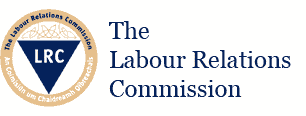Assistance to Joint Industrial Councils
 Industrial Relations Officers of the Commission act as chairpersons to a number of Joint Industrial Councils.
Industrial Relations Officers of the Commission act as chairpersons to a number of Joint Industrial Councils.
From time to time they also chair joint working groups of unions and management in various employments. Requests for the services of an Industrial Relations Officer to preside at meetings of this nature should be referred to the Chief Executive.
Joint Industrial Councils
The 1946 Act provided for the registration by the Labour Court as "qualified" joint industrial councils of bodies, representative of workers and employers which sought harmonious relations and had rules providing that a strike or lock-out would not take place before a dispute had been considered by the body concerned. The Court was empowered to appoint, on request, a Chairman and a secretary to a registered Council.
The Act imposes three conditions for registration of a Joint Industrial Council. The Council must be substantially representative of the workers affected and of their employers and its object must be the formation of harmonious relations between those it represents. The rules must provide that if a trade dispute arises, a strike or lock-out will not be undertaken until the dispute has been referred to the Council and considered by it.
Three such Councils were registered, in 1948, 1964 and 1965, and still exist though two (Construction and Footwear) have been suspended since 1982 and 1983, respectively, and the third (Dublin Wholesale Fruit and Vegetable Trade) has not met for many years. Previous to their suspension, the Construction and Footwear Councils were actively involved in negotiations on pay and conditions in their industries.
There are also eleven Joint Industrial Councils which have not sought registration. They are chaired by Industrial Relations Officers of the L.R.C. and an officer of the Labour Court acts as their secretary.
A "Qualified Joint Industrial Council" is defined in the Industrial Relations Act, 1946 as an association of persons which complies with the following conditions:-
1. that it is substantially representative of workers of a particular class, type or group and their employers;
2. that its object is the promotion of harmonious relations between such employers and such workers;
3. that its rules provide that if a trade dispute arises between such workers and their employers, a lock-out or strike will not be undertaken in support of the dispute until the dispute has been referred to the association and considered by it.
A body which fulfils these conditions may apply to the Labour Court for registration as a Joint Industrial Council and the Court, if satisfied, will place it on the Register of Joint Industrial Councils
Apart from Registered Joint Industrial Councils, there are a number of others which have not applied for registration. The Labour Court facilitates the Councils - both registered and unregistered - by making available an officer of the Court to act as secretary at their meetings. The meetings are chaired by Industrial Relations Officers of the Labour Relations Commission.
